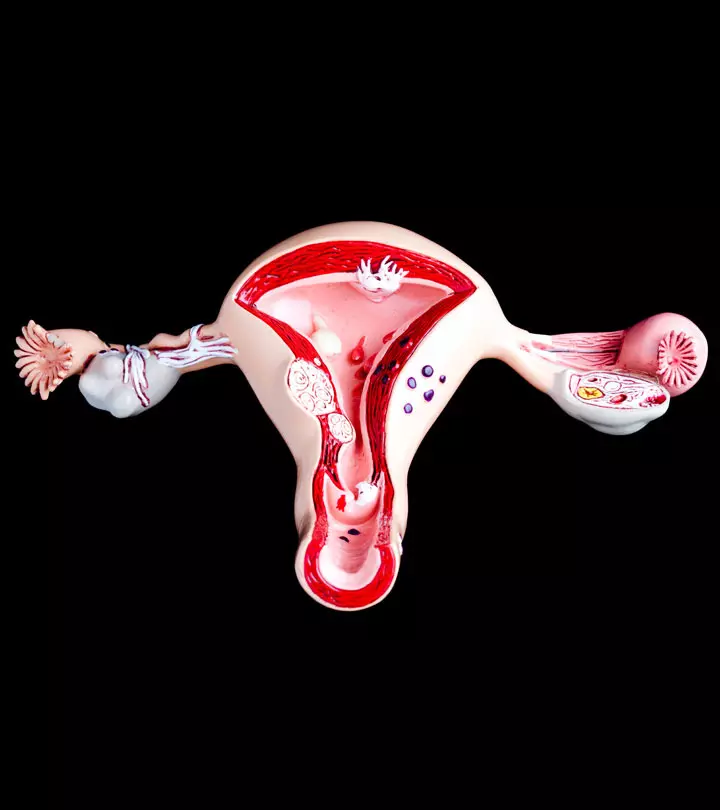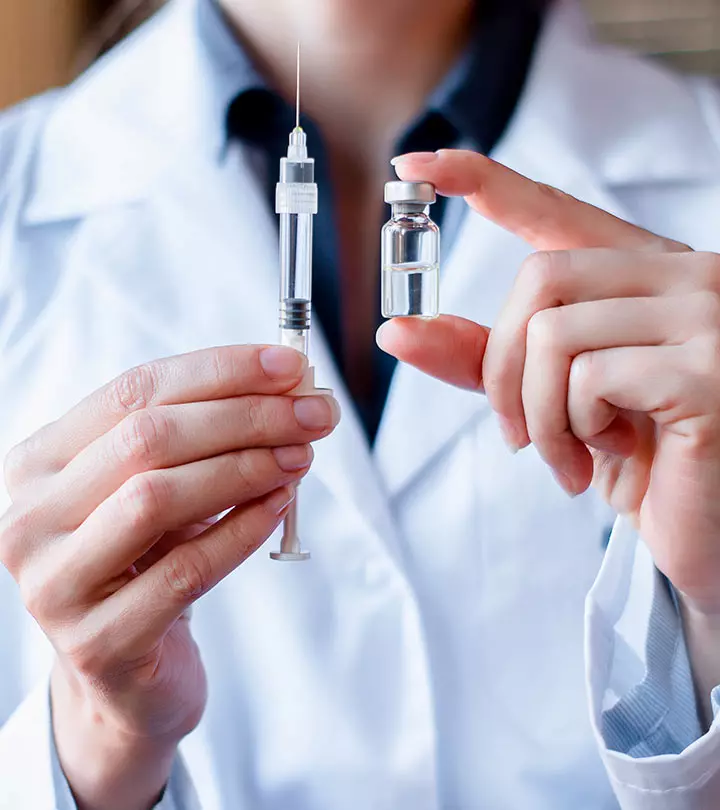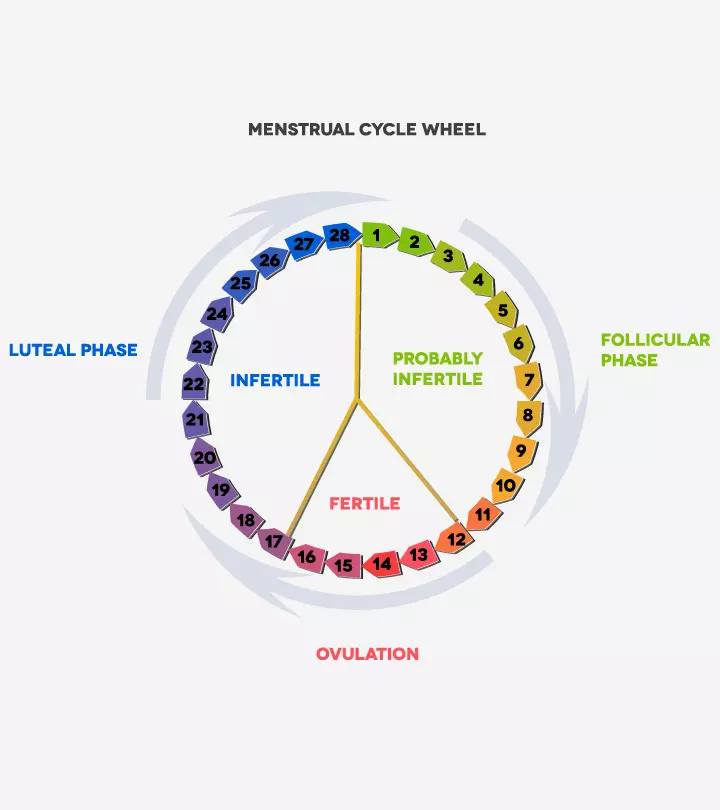
Image: Midjourney/ MomJunction Design Team
The question of how to get pregnant with twins has no definite answer. As fascinating as it may be, the chances of giving birth to twins are often purely random. Different factors, such as genetic or medical procedures, may induce a twin or multiple pregnancies. However, there cannot be a 100% guarantee despite different methods.

Read on as we tell you about the chances of conceiving twins, including factors to increase the probability and different fertility treatments that might help you. Knowing these aspects of twin pregnancies can help prospective parents prepare for the unique challenges and joys that come with having teens.
Key Pointers
- As a woman ages, her chances of conceiving and delivering multiple births increases.
- Factors such as genetics, body type, age, and prior obstetrical events can influence twin conception.
- Fertility treatments such as IUI, IVF, and gonadotropin medications may increase the likelihood of having twins, although they are not recommended.
- A nutritious and balanced diet, rich in dairy products, may be advantageous in increasing the chances of producing twins, compared to a diet low in fat.
How Are Twins Conceived?

There are two types of twins – identical (non-fraternal) and non-identical (fraternal) (1).
Nearly one-third of twins are identical twins, also known as monozygotic twins. They happen by chance and develop when one egg is fertilized by one sperm and gets divided into two separate embryos. They share the same genetic composition and placenta. Identical twins can also happen in women who undergo fertility assistance methods.
Non-identical, also known as dizygotic twins, develop when two eggs are fertilized by two sperms. They are unique and do not share the genetic composition or placenta. As non-identical twins share only half of the same genetic makeup, they are not always of the same gender.
How Common Are Twin Pregnancies?
Twin pregnancies are uncommon. On an average, twins naturally occur in approximately 1 out of every 250 pregnancies. The likelihood of a multiple pregnancy increases with age or fertility treatments (2) (3).
 Quick fact
Quick factAccording to the data released by the US National Center for Health Statistics, the twin birth rate showed an increasing trend with the increase in the age of the mother. A woman pregnant at 40 or more seems to have a higher chance of having twins when compared to a younger mother. However, between 2014 and 2018 there has been a remarkable decrease in the number of twin births in the 40+ women, while it slightly increased for the mothers under 20 years of age. See the graph for more details. It’s worth noting that there is no guaranteed method on how to get twin pregnancies naturally.

Twin birth rates from 1980 to 2018 in the US
Source: Centers for Disease Control and PreventionFactors That Determine The Chances of Having Twins
As said earlier, identical twins could only happen by sheer chance. There is no best bet on how to have twins. However, certain factors might influence the chances of having fraternal twins.
1. Family history/ heredity

If you are a twin or twins run in your family, you are more likely to have twins. However, if your partner has a twin or there are twins in their family, it is not going to influence your chances of having or not having twins. According to the US National Institutes of Health (NIH), the chance of conceiving dizygotic twins doubles if a close relative, like a sister, has had them (3).
It all depends on you because you produce the eggs. If you or your mother is a twin, the probability of you having twins is high. You may have higher chances of hyperovulation (releasing two eggs during ovulationiA phase during the menstrual cycle where a mature egg releases from the ovary process). A few specific genes combine with hyperovulation and thus increase the frequency of non-identical twins (3).
2. Ethnicity / Race
Your origin is also believed to have a strong influence on your chance of having twins. Asians and Hispanics have fewer chances of producing twins, whereas Africans are highly probable, followed by Europeans.
According to research conducted by March of Dimes during 2025-2025 in the US, the rate of multiple births per 1,000 live births was highest among Black infants (41.9%), followed by White infants (33.5%), American Indian/Alaska Native infants (26.0%), Hispanic infants (24.7%), and Asian/Pacific Islander infants (24.6%) (4).
According to research conducted by March of Dimes during 2025-2025 in the United States, the rate of multiple births per 1,000 live births was highest among Black infants (41.9%), followed by White infants (33.5%), American Indian/Alaska Native infants (26.0%), Hispanic infants (24.7%), and Asian/Pacific Islander infants (24.6%).
 Quick fact
Quick fact3. Type of body (height & weight)
Although strange, it is said that taller women are more likely than shorter ones to conceive with twins. Also, heavier women have higher chances than thinner women.
Women who have a well-nourished diet might be at a higher probability of producing twins than those who have a reduced and low-fat diet.
A research study published by the American College of Obstetrics and Gynaecology states that the increasing rates of multiple births are due to increased rates of obesity. It is found that women with a body mass indexiA measurement of body fat for both men and women according to their height and weight (BMI) of 30 and above are more likely to produce twins. This holds for only fraternal twins (5).
4. Maternal age
Your chance of having twins or more babies may increase with advancing age. Women above 35 years produce more FSH (follicle-stimulating hormoneiA hormone located in the pituitary gland that is responsible for the growth of follicles or eggs in females and sperms in males ) than younger women (6). This hormone allows the ovaries to release eggs for ovulation. The higher the hormone levels, the more the eggs released during ovulation are, thereby resulting in multiple fetuses.
5. More pregnancies
If you have had multiple pregnancies before, there may be a high chance of producing twins. The probability of twins might also improve with the increasing number of pregnancies (19).
Fertility Treatments To Have Twins
Fertility treatments provide better chances of having twins. Your doctor can suggest the best option for you. However, experts discourage multiple babies through fertility treatments.
1. IVF (in vitro fertilization)
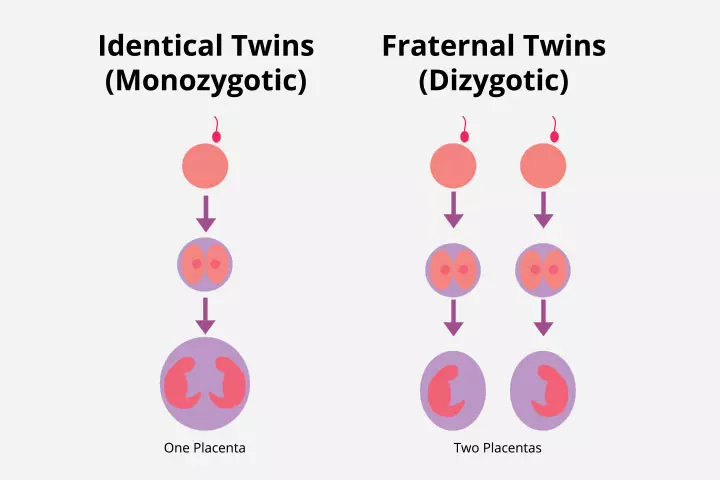
Women who undergo in vitro fertilization (IVF) may have a fair chance of giving birth to more than one baby. However, it mainly depends on the number of embryos placed in the uterus.
To increase the odds of twin conception, healthcare experts might place more than one embryo into the womb. If both are implanted and developed successfully, it is likely to result in a twin pregnancy.
2. IUI (intrauterine insemination)
In this procedure, the sperms are injected into the uterus using a syringe. However, IUI alone will not increase the chances of having multiples. Fertility drugs for women may be prescribed to increase the likelihood of having multiples in this treatment.
3. Gonadotropin
These medications might improve the chances of having twin babies as they enhance the overall health of eggs and their maturity. GonadotropinsiHormones regulating ovarian and testicular functions for sexual development are likely to stimulate the release of more than one egg at a time (6). Your doctor can prescribe the right one for you.
 Quick fact
Quick fact4. Clomiphene citrate
There is around a 10% chance of producing twins with Clomiphene or Clomiphene citrateiIs a medication that is used to treat infertility in women who do not ovulate but wish to get pregnant. (7). Women who already have a higher probability of twin births may also improve their chances further with this drug. The pill may be taken before trying assisted reproductive treatments like in vitro, to promote egg production.
It might also help treat hormonal imbalances in men, which may affect the quality and quantity of sperm, and their motility.
Fertility Herbs For Twins
Although there is no science supporting the use of herbs for twin conception, alternative forms of medicine, such as Chinese and Ayurvedic medicine still encourage using certain herbs for fertility and conception. Again, there is no direct evidence about how well they could promote twin or multiple pregnancies.
- Evening primrose oil is believed to promote healthy cervical mucusiA gel-like discharge produced by the cervix that indicates the most fertile time of your menstrual cycle that might allow the sperm to survive within the ovary for a longer time.
- Licorice is said to control hormonal levels of estrogen and testosterone and might support conception.
- Flaxseed oil is likely to boost fertility and might increase the chances of twin conception.
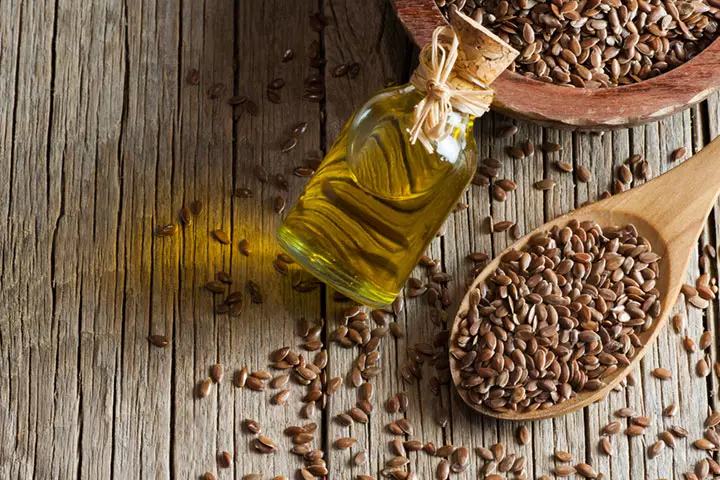
- Sweet cassava is also said to increase the chances of twins due to its hyper-ovulation properties.
- Black cohosh is not known to increase the chance of twin conception, but it is believed to increase the fertility rate.
- Vitex (chaste tree berry) might regulate hormonal levels, promote ovulatory function, and help prevent ovarian cysts, all of which are thought to be favorable for twin conception.
- Maca root is also believed to improve overall fertility which might improve the chances of having twins.
Although these herbs are natural, they may have side effects. Additionally, the information on using herbs to conceive twins is limited and often anecdotal. Therefore, experts recommend consulting a certified herbalist or naturopath before using herbs.
Natural Ways That Might Improve Chances Of Conceiving Twins
The following options are likely to boost your chances of having twins. However, they are just common beliefs based on anecdotal evidence and do not have any scientific backing.
1. Dairy products
Women who eat dairy are more likely to increase their chances of producing twins than women who do not consume these products. It is thought that the growth hormones present in milk (dairy from growth hormone-treated cows) may help in having twins
Dr. Gary Steinman, MD, Ph.D., an attending physician at Long Island Jewish Medical Center, New York, says, “The continuing increase in the twinning rate into the 1990s, however, may also be a consequence of the introduction of growth-hormone treatment of cows to enhance their milk and beef production.”
 Experts say
Experts say2. Wild yams
Wild yams are said to hyper-stimulate the ovaries, resulting in the release of more than one egg for ovulation. It may, therefore, increase your chances of producing twins. African women are believed to have better chances for twins because they consume it as a part of their ethnic diet. The Yoruba tribe in West Africa has the highest twinning rate (8).
Increasing the chances of having twins can be influenced by natural fertility foods. Mai Zimmy, a mother of three and vlogger, shares some tips she explored to enhance her odds of conceiving twins. She explains, “One thing that I became quite focused on when trying to conceive twins was incorporating yams into my diet (i).” Zimmy ended up conceiving identical twins.
3. Stop birth control pills
When you stop taking birth control medication, your body takes some time to find its natural rhythm. One study report states that there is a chance of conceiving twins within a year of stopping oral contraceptives (9).
4. Pregnancy while breastfeeding
A study found that women who conceived while breastfeeding were more likely to have twins (10).
5. Zinc-rich foods
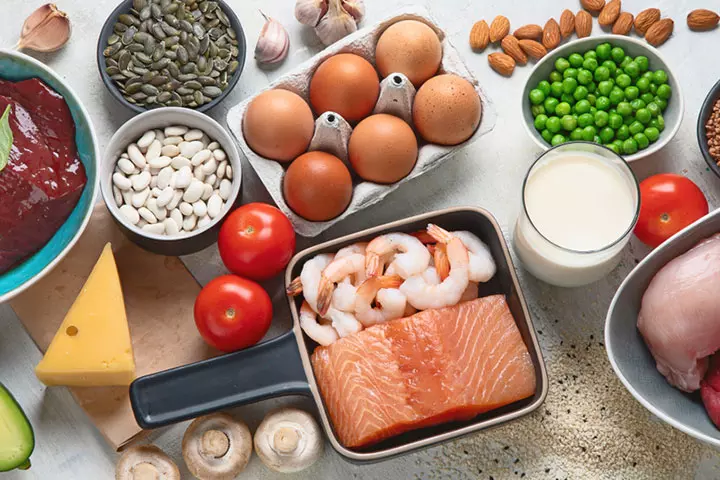
Zinc is known to improve sperm levels. So you could ask your partner to include nutrition-rich foods such as pumpkin seeds, lamb, green peas, and yogurt, which are rich in zinc (11). It might increase the probability of fertilizing more than one egg.
6. Space between pregnancies
Your chances of conceiving twins may be higher if you have enough gap between your pregnancies.
Do Certain Sex Positions Help Conceive Twins?
Though it is believed that some sex positions might help achieve twin pregnancy, there are no scientific studies to support these claims. However, according to various myths and beliefs, several positions of sex for pregnancy help conceive twins. These include:
1. Side by side
Known as doggy style, it is thought to boost a woman’s chance of conceiving twins as the cervix is more approachable to the sperms in this position.
2. Standing up position
It is also another doggy style and is believed to have a chance of deep penetration, which may influence your chance of having twins.
3. Missionary position
The man-on-top position is also thought to help the sperm to enter the egg easily, and probably help produce twins.
4. Rear entry position
Here, the partner enters from behind, so it is believed that the sperm remains close to the cervix of the woman, affecting the chances.
Signs You’re Having Twins
Certain signs may indicate a multiple pregnancy, but these signs don’t always confirm that you’re carrying twins. Early signs and symptoms of twin pregnancy may include:
- Feeling early fetal movements
- Hearing multiple heartbeats with a fetal Doppler
- A fundal height larger than what is typical for the gestational age, suggests a bigger baby bump
- Elevated levels of hCG (pregnancy hormone) or alpha-fetoprotein (AFP), which is made by the fetus’s liver
- Sensing fetal movements in different areas
- Quick weight gain (1)
The symptoms may differ among women, with some experiencing mild symptoms and others facing more intense reactions. Reflecting on her discomfort with twin pregnancy signs, mother and blogger Shana says, “After seven rounds of IUIs, countless ultrasounds, a belly that resembled a swollen pincushion from the numerous injections, hormone-induced chaos, a miscarriage, a vanishing twin, and a round of IVF — I finally became pregnant with twins. I was elated at first.
“By about week eight, things felt not quite so rosy. The first four months of my pregnancy I was so nauseated that I was barely functional. I felt guilty because I was feeling physically awful and miserable most of the time when I felt I ‘should have’ been just appreciative to be pregnant, as this is all I ever wanted (ii).”
Risks And Complications Of Twin Pregnancies
Having twins means double the joy and cheerfulness in the family; however, it is essential to know that twin pregnancies have their own risks and complications for both the mother and the babies (12).
Maternal risks:
- Preterm labor
- Gestational diabetes and hypertension
- Anemia
- Miscarriage
- Cesarean delivery
- Postpartum hemorrhage
Fetal risks:
- Preterm birth
- Birth defects
- Twin-to-twin transfusion syndrome (TTTS)
- Amniotic fluid abnormalities
- Intrauterine growth restriction (IUGR)
- Selective growth restriction
- Twin anemia
- Cord entanglement
Having twins is a delightful experience, but there is no guaranteed method on how to get twin babies. Heredity, race, and maternal age are some factors that can positively influence your chances of having twins. IVF and IUI are assisted reproductive methods that can help you conceive multiple babies, though using these methods to conceive multiple babies is strongly discouraged by experts. Some herbs, such as black cohosh and licorice, certain foods, and sex positions are thought to help in twin pregnancy. However, no clinical evidence exists to support these beliefs. Having twins is a matter of sheer luck.
Frequently Asked Questions
1. Can I have twins through natural birth?
Yes, although many women believe that twins can only be born through C-section delivery, more than 40% of women give birth to their twins naturally (vaginal birth) (13).
2. When are twins usually delivered?
Most twins get delivered between 32 and 38 weeks, depending on the pregnancy conditions (14).
3. Do twins skip a generation?
Since twin birth is influenced by factors such as genetics, maternal height, and medical interventions, the popular belief that twins skip a generation is false. People may believe this myth because men inherit their genes from their mothers. They may then pass this gene to their daughters, who may give birth to twins in the next generation (15).
Infographic: Natural Ways That Might Improve Chances Of Conceiving Twins
Although conceiving twins mostly depends on uncontrollable biological factors, if your doctor allows it, you may also try some natural approaches to increase your chances. From consuming different foods to adapting a specific technique, explore the different ways to improve your chances of conceiving twins. But remember to consult your Ob/GYN first to avoid complications.
Some thing wrong with infographic shortcode. please verify shortcode syntax
Illustration: How To Have Twins: Positions Treatment And Tips To Try

Image: Dall·E/MomJunction Design Team
A fertility expert can provide reliable information concerning the phenomenon of having twins. Learn the facts on how to increase your chances of having twins.
Personal Experience: Source
MomJunction articles include first-hand experiences to provide you with better insights through real-life narratives. Here are the sources of personal accounts referenced in this article.
i. How to get pregnant with twins & chances of having twins naturally.https://www.youtube.com/watch?v=PkO9VJ39Ogo&feature=youtu.be
ii. This was not the pregnancy I anticipated!;
https://medium.com/@karisa.peer/this-was-not-the-pregnancy-i-anticipated-a88f8a9f5c77
References
- Twins, triplets, and other multiples; Office on Women’s Health; U.S.
https://womenshealth.gov/pregnancy/youre-pregnant-now-what/twins-triplets-and-other-multiples - Births: Final Data for 2017; National Vital Statistics Reports; CDC/National Center for Health Statistics (2018)
https://www.cdc.gov/nchs/data/nvsr/nvsr67/nvsr67_08-508.pdf - Is the probability of having twins determined by genetics? Genetics Home Reference (NIH)
https://medlineplus.gov/genetics/ - Singletons & Multiples
https://www.marchofdimes.org/peristats/data?reg=99&top=7&stop=72&lev=1&slev=1&obj=1 - Reddy UM et al.; Relationship of maternal body mass index and height to twinning; Obstet Gynecol. (2005)
https://www.ncbi.nlm.nih.gov/pubmed/15738030 - Chorionic Gonadotropin; APP Pharmaceuticals LLC (2011)
https://www.accessdata.fda.gov/drugsatfda_docs/label/2011/017067s057lbl.pdf - Hughes, Edward, et al.; Clomiphene Citrate for Unexplained Subfertility in Women; National Library of Medicine (2010)
https://www.ncbi.nlm.nih.gov/pmc/articles/PMC7052733/ - A. Akinboro et al.; Frequency of twinning in southwest Nigeria; Indian J Hum Genet. (2008)
https://www.ncbi.nlm.nih.gov/pmc/articles/PMC2840794/ - M F Murphy et al.; Is there an increased risk of twinning after discontinuation of the oral contraceptive pill; J Epidemiol Community Health. (1989)
https://www.ncbi.nlm.nih.gov/pmc/articles/PMC1052849/ - Steinman G; Mechanisms of twinning. IV. Sex preference and lactation; The Journal of Reproductive Medicine; Europe PubMed Central (2001)
https://europepmc.org/abstract/med/11762143 - Osadchuk, Ludmila, et al.; Impact of Seminal and Serum Zinc on Semen Quality and Hormonal Status: A Population-based Cohort Study of Russian Young Men (2025)
https://www.ncbi.nlm.nih.gov/pmc/articles/PMC5203687/ - Multiple Pregnancy Complications; Brigham and Women’s Hospital
https://www.brighamandwomens.org/obgyn/multiples-center/complications-multiples-pregnancy - Giving birth to twins or more; NHS
https://www.nhs.uk/pregnancy/labour-and-birth/what-happens/giving-birth-to-twins-or-more/#:~:text=Can%20you%20have%20a%20natural - Twin Pregnancy: Answers from an Expert; Johns Hopkins Medicine
https://www.hopkinsmedicine.org/health/conditions-and-diseases/staying-healthy-during-pregnancy/twin-pregnancy-answers-from-maternal-fetal-medicine-specialist#:~:text=While%2040%20weeks%20is%20the - 5 Proven Ways to Tell if You’ll Have Twins; Creating a Family
https://creatingafamily.org/ - Overview of Multiple Pregnancy; University of Rochester Medical Center
https://www.urmc.rochester.edu/encyclopedia/content?contenttypeid=85&contentid=P08019#:~:text=African%2DAmerican%20women%20are%20more - Fertility Treatments for Females; NIH (2017)
https://www.nichd.nih.gov/health/topics/infertility/conditioninfo/treatments/treatments-women#clomiphene - Study finds that a woman’s chances of having twins can be modified by diet; EurekAlert
https://www.eurekalert.org/news-releases/790312 - Twins – identical and fraternal
https://www.betterhealth.vic.gov.au/health/conditionsandtreatments/twins-identical-and-fraternal - Christiaan Monden et al. (2025); Twin Peaks: more twinning in humans than ever before.
https://pmc.ncbi.nlm.nih.gov/articles/PMC8129593/
Community Experiences
Join the conversation and become a part of our nurturing community! Share your stories, experiences, and insights to connect with fellow parents.
Read full bio of Dr. Sangeeta Agrawal
Read full bio of Rebecca Malachi
Read full bio of Swati Patwal
Read full bio of Reshmi Das








